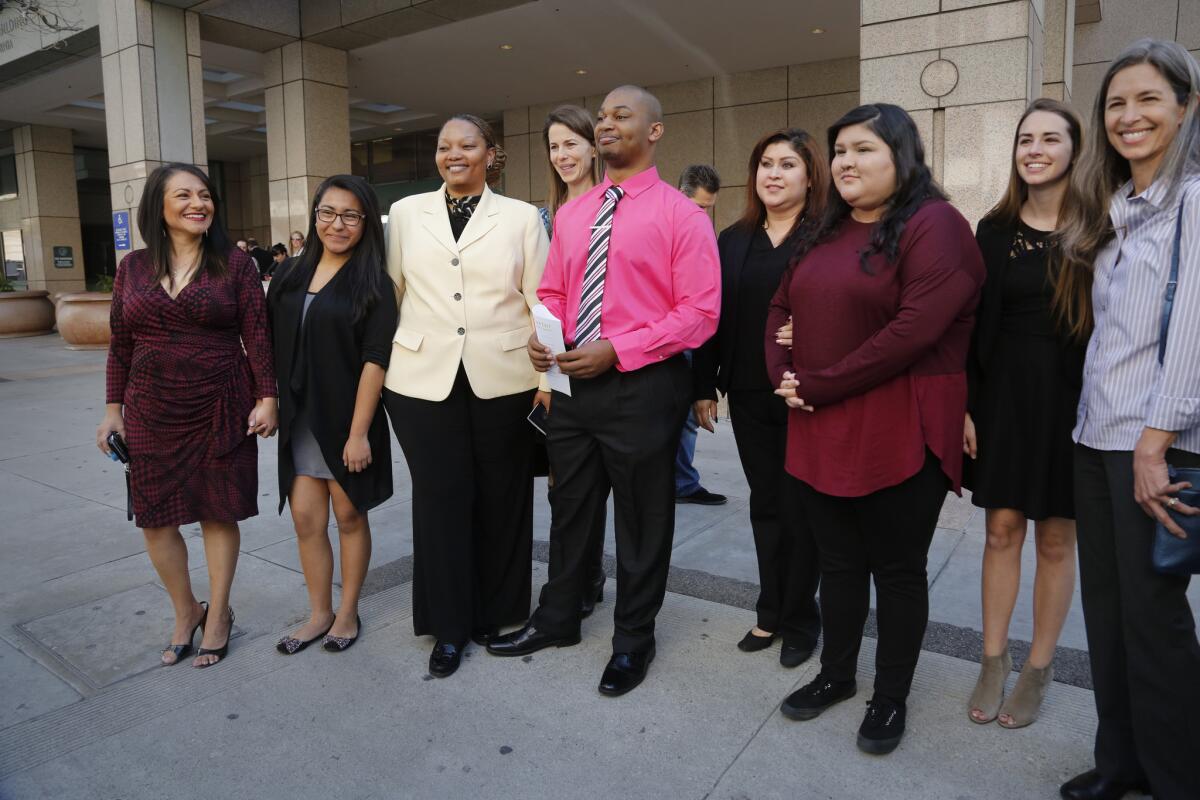California’s teacher tenure battle is reignited by Vergara appeal and a new bill

- Share via
The fight over teacher tenure in California continues.
On Tuesday, former students who sued over the issue asked the state Supreme Court to hear their appeal of the judicially whipsawed Vergara v. California case.
Meanwhile lawmakers have introduced legislation that one opponent has labeled “Vergara Lite” to change the way California’s educators are hired and fired.
See the most-read stories this hour >>
In Vergara v. California, lawyers representing a diverse group of students claimed that the state laws governing the process through which teachers earn tenure and are laid off in reverse order of seniority and the cost of their dismissal hurt students. They argued that the laws were unconstitutional because they resulted in a disproportionate number of ineffective teachers working in minority schools.
In 2014, L.A. County Superior Court Judge Rolf Treu ruled in favor of the plaintiffs, calling the statutes unconstitutional. The state appealed shortly thereafter.
In April, the Court of Appeal for the second appellate district threw out the ruling, noting in its 3-0 decision that the laws questioned by the suit weren’t responsible for harming students, even if their implementation by school districts might be.
Randi Weingarten, president of the American Federation of Teachers union, said in a statement Tuesday that “It is not the law that is the problem, but poor practices by local administrators.You can’t fire your way to a better public education system.”
The Supreme Court appeal by Students Matter, the organization of attorneys and public relations professionals supporting the original suit, asserts that the appeals decision “breaks sharply with this Court’s proud history of protecting the educational opportunities of California schoolchildren.”
“We are confident the Supreme Court will act to safeguard the children of this great state by granting review,” said Theodore J. Boutrous, Jr., the plaintiff’s lead counsel.
The California Teachers Association, which has fought the lawsuit from the beginning, issued a statement asserting that Appeals Court judge Roger W. Boren’s ruling — that “Plaintiffs failed to show that the statutes themselves make any certain group of students more likely to be taught by ineffective teachers than any other group of students” — is essentially bulletproof.
It is unlikely that the Supreme Court will take up the case, said Kevin Welner, an education professor at the University of Colorado, Boulder who also has a J.D. If they do, he said, “there’s a zero percent chance that the trial case decision would be reinstated ... because it was so poorly reasoned.”
Meanwhile, this month, Democratic Assembly Member Sue Bonilla introduced AB 934, a bill that would change the process for earning tenure and firing teachers.
Currently, two years after starting work, teachers in California can earn tenure or be dismissed. Under the new bill, teachers who have logged three years on the job could earn tenure, while teachers who end their third year and are evaluated as ineffective would go into a peer-review process.
After a fourth year as a probationary teacher, that person would either be fired or granted tenure.
Under the bill, tenured teachers who get a negative evaluation enter a year of coaching. If, by the end of that year they don’t improve, the bill makes it easier for them to be dismissed.
Bonilla, a teacher, said the Vergara case put the issue on her radar.
“My desire is to find a middle way, to cut through the politics on the issue,” she said. “I don’t want to see teachers attacked, I don’t want to ignore the fact that there are some issues we could work on to improve student outcomes and teacher performance.”
Students Matter and Teach Plus, another education reform group, endorsed the bill.
The teachers unions oppose it.
Joshua Pechthalt, president of the California Federation of Teachers, said that increasing the time it takes to get tenure “is not the solution.”
He said that tying dismissal to teacher’s performance evaluations is problematic. “The Vergara lite approach does not deal with getting teachers into the profession,” he said.
The teachers association sent a letter to Sen. Carol Liu, who chairs the California Senate Education Committee, saying it opposes the bill because it “would have the unintended effect of keeping ineffective new teachers in classrooms longer” and “erodes certificated employee rights.”
Layoffs, the association wrote, would become more expensive under the law, because it allows teachers to appeal their evaluations.
For her part, Bonilla said, her door is always open. “The union disagrees with me,” she said, “but as a former teacher, I feel like this is going to help teachers.”
MORE EDUCATION NEWS
Cal State trustees agree to boost faculty salaries, ending yearlong dispute
Teacher abuse payouts top $300 million as L.A. Unified misses warning signs
Portland schools tried to change how they teach climate change — and ignited a firestorm
Follow me @Joy_Resmovits.
More to Read
Sign up for Essential California
The most important California stories and recommendations in your inbox every morning.
You may occasionally receive promotional content from the Los Angeles Times.











